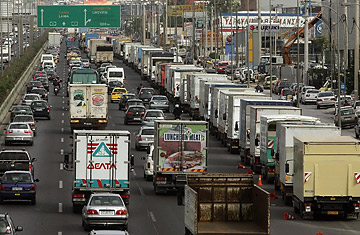
Traffic congestion at Athens-Thessaloniki national road in Greece.
Asked why Athenians are so attached to their cars, pharmacist Ion Economakis offers some over-the-counter expertise: "Public transportation," he says flatly, "is a major cause of depression." Honking traffic jams and harrowing taxi rides — and a daylong public transportation strike — had inspired me to find out why the Greek capital is afflicted with Europe's highest rate of car ownership (almost one vehicle for every two residents). But even when the buses and subways are running, Economakis recommends avoiding them. Wearing his white lab coat and surrounded by bottles of heartburn and headache pills, the pharmacist goes through a health-warning list of the perils of the mass commute. "Public transportation is a major cause of the flu. And of headaches. It is also a major cause of," he pauses, for comic timing, "pickpockets."
But some Greek lawmakers have had enough of the choking traffic, and they're prescribing for Athens the same strong medicine that has worked in London and other European cities — charging a toll on every car entering the city center. Economakis, not surprisingly, is fiercely opposed, saying that he already shells out 200 euros ($270) a month for parking near his downtown pharmacy. Still, he says, he would never give up the daily comfort and conveniences of driving into work, even though it takes him an hour to travel just a few kilometers from his north Athens home if he dares to leave after 8 a.m. "Nobody pushes up against you in your own car," he notes. "You're not obliged to smell everybody." Economakis even has a DVD player inside his BMW sedan in case the roads get really jammed. And just in case you were counting, he also has two Volkswagon Golfs — one for his wife and one for their son, who's not yet three years old.
Actually, anyone who wants to drive into the city center every day must have at least two cars, one whose plate number ends on an even number, the other on an odd number — current congestion rules alternate daily between barring odd and even license plate numbers from entering the city center. Athens Deputy Mayor Chronis Akritidis, who's responsible for city infrastructure, is always looking for new ways to get people to leave their cars at home. The city has reserved 10,000 parking spaces for residents of the central neighborhoods, substantially raising the difficulty of commuters finding parking. Athens has also reserved 30 miles of traffic lanes solely for busses. There are several subway extensions to outlying neighbourhoods under construction, although Athens — like Rome — is victim of its archeological riches, which often block underground projects.
The proposed daily toll for entry, like the congestion charges first introduced in London in 2003 — and experimented with in places like Singapore and Stockholm — may be beyond what Athenians are ready to accept. "We still have to work on changing people's mentality," says Akritidis.
Makis Dedes, an Athens limousine driver, spends his earnings on upkeep of his vintage Mercedes 280SC convertible. "You and your car go together," he said, during a break from shining his work wheels, a black Mercedes sedan that has toured Sharon Stone and Monica Bellucci around the Greek capital. "It's not just a toy. It's like your child and you pamper it all the time." Dedes lived in London for seven years, and doesn't believe that city's traffic management plans should be applied to Athens. "We're different than Brits," he said, holding his Zymold detailer and soft white towel near the bustle of Syntagma square. "People here ignore the laws. In London, a blind man could drive."
On a recent Wednesday largely paralyzed by the public transport strike, one cabbie with a striking resemblance to Roseanne Barr was all for an extra charge on trips into the center, which she says would increase demand for taxis and reduce traffic. But wouldn't the 5-10 euro fee cut into her profits? With a hearty and slightly sinister laugh reminiscent of the chubby American comedienne, she suggested I read the taxi passenger information sign. "Read right there: passenger pays all additional charges!"
George Gianalis, a retired professor of literature, doesn't own a car, and offers modest praise for the public transit system. He's developed what can only be called a hatred for Athenian behavior behind the wheel. "They curse at you. They spit at you. Only the Italians are worse," he says. "If they pay a toll it creates respect." Then, with his own sinister chuckle, Gianalis offered a truly extreme approach to the traffic problem. "All the drivers should be beheaded," he adds. "But they're like chickens. They'd keep on driving!"
